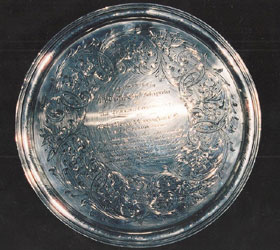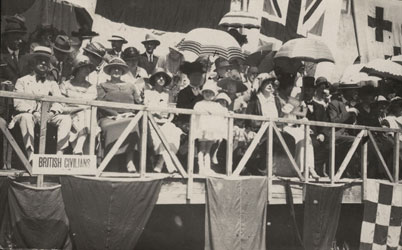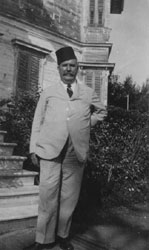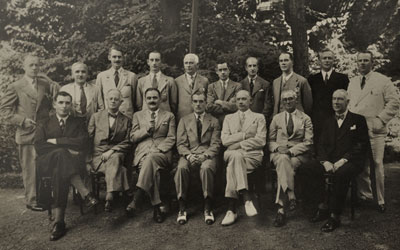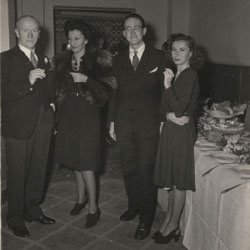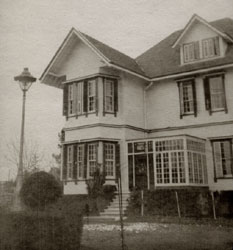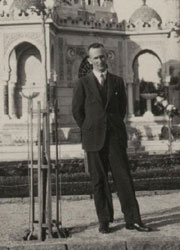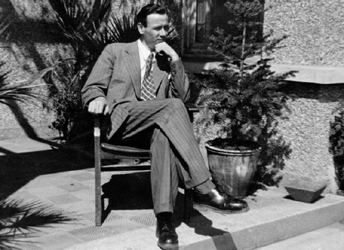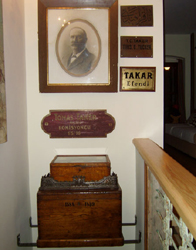I live and work in Istanbul, a city that my great-great grandfather came to call home in the middle of the 19th century, Charles E.A. Tucker. I think he was an engineer in the Ottoman naval forces. Working initially for the British government he later started to collaborate with the Ottomans probably on military and commercial purposes. His son, my great grandfather Thomas Charles Tucker started as an engineer in the Ottoman navy, then set up his own company in 1875 which imported naval goods like varnishes vessel paints, diving suits etc. [a photo of a suit almost certainly provided by the firm] supplying the Ottoman navy and private individuals. Thomas Charles Tucker first resided on the shores of Golden Horn in Hasköy then moved to Mustafa Pasa apartments (now derelict) in Gümüşsuyu Taksim, then moved to Suadiye where he built the family mansion named ‘Thornclyffe’. My grandfather, Thomas John Victor Ferid Tucker, entered the business of wheat mills, marine engines etc. My father, Thomas Ian James Tucker, continued the same business until it’s closure. They were the sole agents for Turkey of the companies like, Mander’s Varnishes – Siebe Gorman - Tangye’s – Stuart marine engines – International Paint – Dewar’s whiskey and many others. I still have a major part of the correspondence with these companies. The company name was Thomas Charles Tucker Koll. Şti., then T.C.T. and Successors. I know that the family preferred the local Levantine companies for shipping, insurance etc., but I do not think they ever became partners with any. The company offices were always based in Galata, where I have my business today, though in a different line.
I don't know much of the circumstances that brought my great-great grandfather to Turkey, and know nothing of his family in England. From his tombstone in Haydarpaşa Cemetery [records], Istanbul, I know he was born in 1809 in Plymouth, Devon, a city with a long standing naval tradition. The tombstone further states that he was an ‘eminent Turkish scholar (I know very little of this side of things as well), died September 21, 1862, settled in Istanbul 1828, in Turkish government service 1828-1839 and of British government 1840-1862, sent to Egypt 1840 and secured release of Turkish fleet seized there, chief interpreter secretary to Field Marshal Lord Raglan C in C of British forces and later major general Gunyngham C in C the Turkish contingent in the Crimean war. British harbour master, Istanbul 1857-1862’. So he clearly was a major player in both British diplomatic circles and was given major responsibilities by the Ottoman government of the time, which had problems to deal with all sorts of quarters, not least an Egypt that broke free from Constantinople control and became a major thorn.
I don't know if Charles E.A. Tucker had any child-bearing offspring apart from my great-grandfather, so there is the remotest possibility that I have distant cousins in distant lands!
Unfortunately my father died in the summer of 2009, so I have few relatives to ask questions to help find answers to some of the questions of the past, however I do have a lot of family files, though mostly concerning business and a batch of old photographs. I have fond memories of my father and though he was modest of his wartime past, he served with the British 8th army during the Second World War in North Africa. He was called Tucker the Turk. I still retain his medals he received. He was in Egypt, Tobruk, South Africa etc. during that service.
My father was the first in the family line to marry a ‘local’, Judith nee Ferrera, a Sephardic Jewish of Istanbul. They got married against the will of both families, proving love conquest all! My dad and mum met at friend’s party and got married in the British consulate. My grandfather had adviced the British Consul General that he was against this marriage. On my dad’s insisting, they agreed to marry them. First they lived in a small house then they moved to My grandmother’s apartment (My mother’s mother). We used to visit the Tucker side of the family once every Christmas. That was how often I used to see my grandparents. My mother’s family and my father’s family almost never saw each other. My mother’s father, Isaac Ferrera, was the prosecutor general [savcı] of Istanbul until the establishment of the republic around 1923.
Christmas eve was always in our house in Nişantaşı. We used to go to Harbiye where they sold real Christmas trees. We used to put it in tin box full of coal and then started decorating it. The day before, it was shopping time. My mother and father used to argue all the time as my father would want to buy the biggest turkey and a pork roll. My mother used to make the stuffing in the American way (bread, bacon, pork sausages, oregano and caramelized onions) then the apple sauce etc. We used to give the turkey to a bakery to cook as it was always bigger than the capacity of our oven. At Christmas eve though the only Christian was my father as all my mother’s side of the family was invited. Christmas day morning we used to wake up and unpack the presents under the tree. For Christmas day lunch we used to go to Bob Kerwin and Evelyn Muriel Tucker’s house in Bebek [archive views]. It was a real treat with music, again turkey imported from America, crackers, Christmas pudding etc. They were the rich side of the family. We did not go to Church. My great-grandfather apparently was the religious person. My father used to tell me that they had to pray every time they had meals at home. He was the one who contributed in the building of the Crimean Memorial Church in Istanbul.
My grandfather Thomas J.V.F. Tucker met his wife Rosemary Selena nee Fiest, of Irish origin, yet born in Shrewsbury, when he was in Greece during the First World War as she was a nurse in British Forces in Greece and he served under British naval forces in that country. My great-grandfather Thomas Charles Tucker married a Scottish lady, Mary nee Blaire, but I don’t know how they met. And I only know the name who his father, my great-great grandfather Charles E.A. Tucker married. It is the oldest document I have, the marriage certificate of Charles E.A.Tucker to a certain Marie from Therapia (probably of Byzantium origins).
My great-grandfather Thomas Charles Tucker used to go to Vienna every year for the annual classic music concerts. Apart from a few England trips, home was vacation for them. Those days Constantinople was paradise on earth with its islands, mountains, crystal clear waters, picnics on the Bosphorus hills, hunting parties etc.
Another person I know almost nothing of was the elder brother of grandfather Thomas J.V.F. Tucker, Charles Hubert Tucker. I only know that his wife Marcelle was not accepted very well in the family because of her exaggerated make-up, clothes and manners.!!! I have a telegram from the train company saying that they could not find the broaches that Mrs. Marcelle claims to have left on the train coming from Paris to Constantinople! Who knows what kind of fuss she must have made...
Notes: In the memoirs of Sir Compton Mackenzie (My Life and Times: Octave five, 1915-1923), there are references to Charles Hubert Tucker who clearly was like his brother involved in the WWI effort and was recruited in the intelligence gathering network, with these words: ‘... and I now had for my Number Two Charles Tucker, to whom I took an immediate liking. His father had a sanitary engineering business in Constantinople but was at present a refugee in Athens with the rest of his family, of which Charles was the eldest. Although he spoke Turkish, Greek and French as fluently as English there was nothing about Charles Tucker to suggest the Levantine Englishman. He was typically the Cockney business man. His cheeks were as pink as wild rose; his full, fair moustache was Saxon to the last hair: there was not an angle in his body. His main object in life ...’. In a biographical work of Compton Mackenzie (a life, Andro Linklater, p. 153), there are clues as to the work Charles Tucker did: ‘... chief assistant was a former sanitation engineer in Constantinople, Charles Tucker, who spoke half a dozen languages but whose most important duty was the typing up of agents’ reports and the coding and decoding of telegram to and from London. In addition there were about forty agents in the field, operating chiefly in Greece and Bulgaria, but later Turkey as well. They were mostly Maltese or Levantine, that is, the children of British and Mediteranean parents.’ Also in the Compton Mackenzie autobiography of (Greek Memories, p. 522), some further insights into the activities of Tucker are revealed: ‘... Knoblock [Edward] and Tucker were indispensible in Syra. Kenny Whittall had the whole administration of the port of Syra to deal with. In the three largest islands, Tenos, Naxos and Andros, British representatives were essential. Braggiotti [Captain George] in Tenos was good, though fussy; Hiscock in Andros was excellent...’. Finally Compton Mackenzie’s other autobiography of (Aegean Memories, p. 4), show the depth of friendship that clearly did build up with C. Tucker and his early death: ‘Dear Tucker, the mention of his name brings a pang, for two or thre years ago, [book was published 1940] in the prime of his life, he died. When the news of my prosecution under the Official Secrets Act reached Constantinople, whither he had returned after his service during the war to take up again in most difficult circumstances the family business of sanitary engineering, he telegraphed to me immediately that “all the boys,” as he called them, were indignant at the news and anxious to help in any way possible. I knew he was hard up at the time, but he volunteered to come to England in order to give evidence on my behalf, and when it was decided to cut the tiresome business short by pleading guilty, perhaps my greatest disappointment was that I did not have the pleasure of hearing the Attorney General examine the amiable man in the witness-box. Now, if I do ever reach Constantinople at last, there will be no Charles Tucker to meet me. For so plump a man his energy was astonishing. In Syra, not withstanding the ordeal of thoses last days in Athens, he had at once started a most efficient censorship of letters and parcels at the old German Consulate, and by the middle of January he was already pestering me to assume the responsibility for food distribution in the Cyclades...’
I recall some anecdotes from my father: My father used tell about his Scottish grandmother who used to ask the children to help cleaning the strawberries and made them whistle all during the work to understand who had a strawberry in his mouth!!! Another time my father’s two dogs killed the cat of my aunt Evelyn and she shot my father with my grandfather Thomas J.V.F. Tucker (Bigda)’s gun which fortunately didn’t have any bullets in it. This is a memory often told to explain how short tempered my aunt was. She had long red hair to match this temperament!
The family house for 3 generations on the Asiatic side of Istanbul, at Suadiye, was destroyed in 1959, the year I was born. It was called ‘Thornclyffe’ as on the waterfront, on the cliffs facing the Sea of Marmara, there were thorns growing. I don’t know when exactly it was built, but I guess somewhere between 1890 and 1910. I found a letter from the government asking permission of my great-grandfather for the road that was planned to pass in front of the property. It became reality only after 70 more years. By then we had sold the property. Thornclyffe was sold around 1956 to a developer who after demolishing it, built 12 apartment blocks with gardens. It was 14 acres land on the sea front and I still have my great-grandfather’s letters with which he ordered flowers from Holland for the garden. I heard relatives talking about 40 rooms in this house, but I doubt it. I know that there was a big billards room and I know that my grandfather always kept a strong rope in his bedroom to be able escape if a fire burst out. My grandfather was a member of the Moda yacht Club but I frankly do not know why they chose Suadiye. It might be because the property had it’s own beach or Moda was populated so big plots were hard to find or simply because the land was cheaper. Then the family moved to a garden flat with sea view in Caddebostan (Asian side) and then to Yeniköy on Bosphorus. My Grandfather and Grandmother both died in Yeniköy and like most of the family are buried at the British cemetery at Haydarpaşa [archive views], in the shadow of the Florence Nightingale Hospital.
My aunts were educated in Thornclyffe (the English house, as it was called in the neighborhood) by private tutors. My father and uncle went to the British High School for boys in Nişantaşı. Other students used to call them “villagers” as they used to come long way from Suadiye crossing farming lands and then the Marmara sea. They had a black house assistant Melahat. My father always said that my grandmother used to love Melahat as if her own daughter.
Life wasn’t always sweet in Turkey. During the Second World War all non-Muslims to some extent were targeted by a hefty tax that crippled many, under ‘wealth tax’. I have the letters with which my family corresponded with the authorities in Ankara in those years begging to understand that they had no means of paying such big amounts of unjustified tax. They then had to hand ‘Thornclyffe’ to the British Consulate to avoid its seizure by the tax office. They were able to repossess it after a couple of years. The 1955 anti-Greek riots did not effect my family but my Grandfather used to speak fluently Greek. That meant he had many Greek friends. Even his book keeper was Greek. So according to me these events were the beginning of the end for the paradise.
The family company ended around 1989 when my father decided to retire. I then kept the office in Galata closed for more than 8 years just to preserve it as it is. Then the landlord wanted to repossess the place so I moved everything to Milan in Italy (I used to live there). I restored most of the furniture and when I moved back to Istanbul in 2000, I bought most of it back again. My father was a very generous person so he used to give away marine engine parts to the fishermen who were his friends. So there was not much profit in the business in its latter years.
As importers of Stuart Marine Engines, the family always had small boats with a cabin where only two could sleep. My childhood as well passed on boats, fishing, mussle collecting and sometimes just going to the islands. Grandfather was a member of the Moda Yacht Club.
My uncle Desmond also served during World War II and after his return worked for the British Airways. He never did marry and he passed away in 1997 (if I am not mistaken).
For my education I went to Kadıkoy Maarif Koleji. Every year I had the worst grades from English lessons as the teachers were expecting proper English from a per with a name like Jeffrey Charles Tucker. At home, we spoke only Turkish and I learned English in this Turkish school!
To my knowledge, my family never considered a move to England. Although my Grandmother until the day she died did not speak a word in Turkish. I guess she was never very happy to be in Turkey. My father, whenever he was abroad, always strongly missed Istanbul. This city is home for me as well. Although it is now unrecognizable since the times of my childhood. It is a love and hate relationship, but the love must win as I still live here.
I have been interested in my family past since my 20s. There is still scope for me to continue a wider historical investigation, for example some of the letters in the family archives I still retain are to my grandfather from Englishmen enquiring the conditions in Turkey and work opportunities - perhaps some did make the move, and some were successful - a study that would not be impossible as the names are there. I would be grateful if any readers can help me find more of my family past, particularly the possibility of researching the origins in Plymouth if people have the means / you can contact me via e-mail. tucker[at]atlas.net.tr.
At present (2010), since my return from Italy in 2000, I am finally active in my relation with period buildings!! I do restoration of facades and interiors of 19th century buildings, houses. I started as soon as I returned from Italy, starting with the one I was living in. Maybe I returned from Italy for this as the buildings in Italy were already taken care for whereas in my city they were in total neglect. I am not an architect, I work with architects and engineers. I am more the consultant for the reconstruction of the original features, studying the fabric and arrangement of the buildings to try to work out what was where, and source original missing elements. One day I would like to restore a hamam [Turkish bath], but re-create it in the authentic manner they were arranged in Ottoman times, something lacking in the city. Finally I do something that I totally like which makes me happy.
 submission date 2010
submission date 2010
|
|
|
I don't know much of the circumstances that brought my great-great grandfather to Turkey, and know nothing of his family in England. From his tombstone in Haydarpaşa Cemetery [records], Istanbul, I know he was born in 1809 in Plymouth, Devon, a city with a long standing naval tradition. The tombstone further states that he was an ‘eminent Turkish scholar (I know very little of this side of things as well), died September 21, 1862, settled in Istanbul 1828, in Turkish government service 1828-1839 and of British government 1840-1862, sent to Egypt 1840 and secured release of Turkish fleet seized there, chief interpreter secretary to Field Marshal Lord Raglan C in C of British forces and later major general Gunyngham C in C the Turkish contingent in the Crimean war. British harbour master, Istanbul 1857-1862’. So he clearly was a major player in both British diplomatic circles and was given major responsibilities by the Ottoman government of the time, which had problems to deal with all sorts of quarters, not least an Egypt that broke free from Constantinople control and became a major thorn.
I don't know if Charles E.A. Tucker had any child-bearing offspring apart from my great-grandfather, so there is the remotest possibility that I have distant cousins in distant lands!
Unfortunately my father died in the summer of 2009, so I have few relatives to ask questions to help find answers to some of the questions of the past, however I do have a lot of family files, though mostly concerning business and a batch of old photographs. I have fond memories of my father and though he was modest of his wartime past, he served with the British 8th army during the Second World War in North Africa. He was called Tucker the Turk. I still retain his medals he received. He was in Egypt, Tobruk, South Africa etc. during that service.
- an alternative gathering, similar period:. |
|
|
My father was the first in the family line to marry a ‘local’, Judith nee Ferrera, a Sephardic Jewish of Istanbul. They got married against the will of both families, proving love conquest all! My dad and mum met at friend’s party and got married in the British consulate. My grandfather had adviced the British Consul General that he was against this marriage. On my dad’s insisting, they agreed to marry them. First they lived in a small house then they moved to My grandmother’s apartment (My mother’s mother). We used to visit the Tucker side of the family once every Christmas. That was how often I used to see my grandparents. My mother’s family and my father’s family almost never saw each other. My mother’s father, Isaac Ferrera, was the prosecutor general [savcı] of Istanbul until the establishment of the republic around 1923.
Christmas eve was always in our house in Nişantaşı. We used to go to Harbiye where they sold real Christmas trees. We used to put it in tin box full of coal and then started decorating it. The day before, it was shopping time. My mother and father used to argue all the time as my father would want to buy the biggest turkey and a pork roll. My mother used to make the stuffing in the American way (bread, bacon, pork sausages, oregano and caramelized onions) then the apple sauce etc. We used to give the turkey to a bakery to cook as it was always bigger than the capacity of our oven. At Christmas eve though the only Christian was my father as all my mother’s side of the family was invited. Christmas day morning we used to wake up and unpack the presents under the tree. For Christmas day lunch we used to go to Bob Kerwin and Evelyn Muriel Tucker’s house in Bebek [archive views]. It was a real treat with music, again turkey imported from America, crackers, Christmas pudding etc. They were the rich side of the family. We did not go to Church. My great-grandfather apparently was the religious person. My father used to tell me that they had to pray every time they had meals at home. He was the one who contributed in the building of the Crimean Memorial Church in Istanbul.
My grandfather Thomas J.V.F. Tucker met his wife Rosemary Selena nee Fiest, of Irish origin, yet born in Shrewsbury, when he was in Greece during the First World War as she was a nurse in British Forces in Greece and he served under British naval forces in that country. My great-grandfather Thomas Charles Tucker married a Scottish lady, Mary nee Blaire, but I don’t know how they met. And I only know the name who his father, my great-great grandfather Charles E.A. Tucker married. It is the oldest document I have, the marriage certificate of Charles E.A.Tucker to a certain Marie from Therapia (probably of Byzantium origins).
My great-grandfather Thomas Charles Tucker used to go to Vienna every year for the annual classic music concerts. Apart from a few England trips, home was vacation for them. Those days Constantinople was paradise on earth with its islands, mountains, crystal clear waters, picnics on the Bosphorus hills, hunting parties etc.
Another person I know almost nothing of was the elder brother of grandfather Thomas J.V.F. Tucker, Charles Hubert Tucker. I only know that his wife Marcelle was not accepted very well in the family because of her exaggerated make-up, clothes and manners.!!! I have a telegram from the train company saying that they could not find the broaches that Mrs. Marcelle claims to have left on the train coming from Paris to Constantinople! Who knows what kind of fuss she must have made...
Notes: In the memoirs of Sir Compton Mackenzie (My Life and Times: Octave five, 1915-1923), there are references to Charles Hubert Tucker who clearly was like his brother involved in the WWI effort and was recruited in the intelligence gathering network, with these words: ‘... and I now had for my Number Two Charles Tucker, to whom I took an immediate liking. His father had a sanitary engineering business in Constantinople but was at present a refugee in Athens with the rest of his family, of which Charles was the eldest. Although he spoke Turkish, Greek and French as fluently as English there was nothing about Charles Tucker to suggest the Levantine Englishman. He was typically the Cockney business man. His cheeks were as pink as wild rose; his full, fair moustache was Saxon to the last hair: there was not an angle in his body. His main object in life ...’. In a biographical work of Compton Mackenzie (a life, Andro Linklater, p. 153), there are clues as to the work Charles Tucker did: ‘... chief assistant was a former sanitation engineer in Constantinople, Charles Tucker, who spoke half a dozen languages but whose most important duty was the typing up of agents’ reports and the coding and decoding of telegram to and from London. In addition there were about forty agents in the field, operating chiefly in Greece and Bulgaria, but later Turkey as well. They were mostly Maltese or Levantine, that is, the children of British and Mediteranean parents.’ Also in the Compton Mackenzie autobiography of (Greek Memories, p. 522), some further insights into the activities of Tucker are revealed: ‘... Knoblock [Edward] and Tucker were indispensible in Syra. Kenny Whittall had the whole administration of the port of Syra to deal with. In the three largest islands, Tenos, Naxos and Andros, British representatives were essential. Braggiotti [Captain George] in Tenos was good, though fussy; Hiscock in Andros was excellent...’. Finally Compton Mackenzie’s other autobiography of (Aegean Memories, p. 4), show the depth of friendship that clearly did build up with C. Tucker and his early death: ‘Dear Tucker, the mention of his name brings a pang, for two or thre years ago, [book was published 1940] in the prime of his life, he died. When the news of my prosecution under the Official Secrets Act reached Constantinople, whither he had returned after his service during the war to take up again in most difficult circumstances the family business of sanitary engineering, he telegraphed to me immediately that “all the boys,” as he called them, were indignant at the news and anxious to help in any way possible. I knew he was hard up at the time, but he volunteered to come to England in order to give evidence on my behalf, and when it was decided to cut the tiresome business short by pleading guilty, perhaps my greatest disappointment was that I did not have the pleasure of hearing the Attorney General examine the amiable man in the witness-box. Now, if I do ever reach Constantinople at last, there will be no Charles Tucker to meet me. For so plump a man his energy was astonishing. In Syra, not withstanding the ordeal of thoses last days in Athens, he had at once started a most efficient censorship of letters and parcels at the old German Consulate, and by the middle of January he was already pestering me to assume the responsibility for food distribution in the Cyclades...’
I recall some anecdotes from my father: My father used tell about his Scottish grandmother who used to ask the children to help cleaning the strawberries and made them whistle all during the work to understand who had a strawberry in his mouth!!! Another time my father’s two dogs killed the cat of my aunt Evelyn and she shot my father with my grandfather Thomas J.V.F. Tucker (Bigda)’s gun which fortunately didn’t have any bullets in it. This is a memory often told to explain how short tempered my aunt was. She had long red hair to match this temperament!
The family house for 3 generations on the Asiatic side of Istanbul, at Suadiye, was destroyed in 1959, the year I was born. It was called ‘Thornclyffe’ as on the waterfront, on the cliffs facing the Sea of Marmara, there were thorns growing. I don’t know when exactly it was built, but I guess somewhere between 1890 and 1910. I found a letter from the government asking permission of my great-grandfather for the road that was planned to pass in front of the property. It became reality only after 70 more years. By then we had sold the property. Thornclyffe was sold around 1956 to a developer who after demolishing it, built 12 apartment blocks with gardens. It was 14 acres land on the sea front and I still have my great-grandfather’s letters with which he ordered flowers from Holland for the garden. I heard relatives talking about 40 rooms in this house, but I doubt it. I know that there was a big billards room and I know that my grandfather always kept a strong rope in his bedroom to be able escape if a fire burst out. My grandfather was a member of the Moda yacht Club but I frankly do not know why they chose Suadiye. It might be because the property had it’s own beach or Moda was populated so big plots were hard to find or simply because the land was cheaper. Then the family moved to a garden flat with sea view in Caddebostan (Asian side) and then to Yeniköy on Bosphorus. My Grandfather and Grandmother both died in Yeniköy and like most of the family are buried at the British cemetery at Haydarpaşa [archive views], in the shadow of the Florence Nightingale Hospital.
My aunts were educated in Thornclyffe (the English house, as it was called in the neighborhood) by private tutors. My father and uncle went to the British High School for boys in Nişantaşı. Other students used to call them “villagers” as they used to come long way from Suadiye crossing farming lands and then the Marmara sea. They had a black house assistant Melahat. My father always said that my grandmother used to love Melahat as if her own daughter.
Life wasn’t always sweet in Turkey. During the Second World War all non-Muslims to some extent were targeted by a hefty tax that crippled many, under ‘wealth tax’. I have the letters with which my family corresponded with the authorities in Ankara in those years begging to understand that they had no means of paying such big amounts of unjustified tax. They then had to hand ‘Thornclyffe’ to the British Consulate to avoid its seizure by the tax office. They were able to repossess it after a couple of years. The 1955 anti-Greek riots did not effect my family but my Grandfather used to speak fluently Greek. That meant he had many Greek friends. Even his book keeper was Greek. So according to me these events were the beginning of the end for the paradise.
|
|
|
The family company ended around 1989 when my father decided to retire. I then kept the office in Galata closed for more than 8 years just to preserve it as it is. Then the landlord wanted to repossess the place so I moved everything to Milan in Italy (I used to live there). I restored most of the furniture and when I moved back to Istanbul in 2000, I bought most of it back again. My father was a very generous person so he used to give away marine engine parts to the fishermen who were his friends. So there was not much profit in the business in its latter years.
As importers of Stuart Marine Engines, the family always had small boats with a cabin where only two could sleep. My childhood as well passed on boats, fishing, mussle collecting and sometimes just going to the islands. Grandfather was a member of the Moda Yacht Club.
My uncle Desmond also served during World War II and after his return worked for the British Airways. He never did marry and he passed away in 1997 (if I am not mistaken).
For my education I went to Kadıkoy Maarif Koleji. Every year I had the worst grades from English lessons as the teachers were expecting proper English from a per with a name like Jeffrey Charles Tucker. At home, we spoke only Turkish and I learned English in this Turkish school!
To my knowledge, my family never considered a move to England. Although my Grandmother until the day she died did not speak a word in Turkish. I guess she was never very happy to be in Turkey. My father, whenever he was abroad, always strongly missed Istanbul. This city is home for me as well. Although it is now unrecognizable since the times of my childhood. It is a love and hate relationship, but the love must win as I still live here.
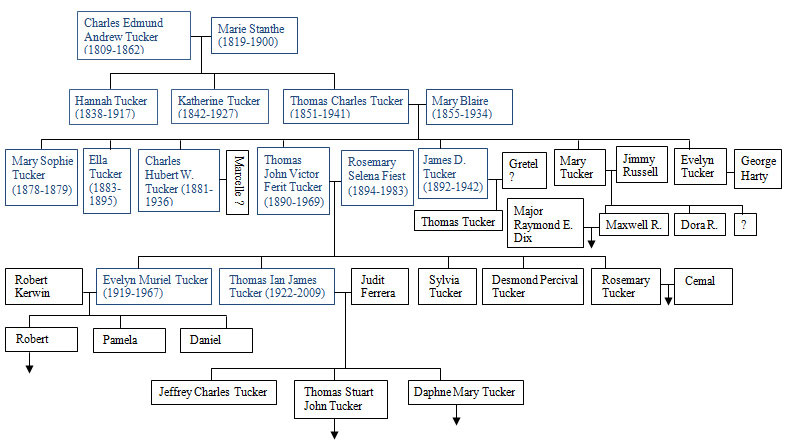 |
Simplified family tree of the Tuckers I am still working on - names in blue buried in Haydarpaşa
I have been interested in my family past since my 20s. There is still scope for me to continue a wider historical investigation, for example some of the letters in the family archives I still retain are to my grandfather from Englishmen enquiring the conditions in Turkey and work opportunities - perhaps some did make the move, and some were successful - a study that would not be impossible as the names are there. I would be grateful if any readers can help me find more of my family past, particularly the possibility of researching the origins in Plymouth if people have the means / you can contact me via e-mail. tucker[at]atlas.net.tr.
At present (2010), since my return from Italy in 2000, I am finally active in my relation with period buildings!! I do restoration of facades and interiors of 19th century buildings, houses. I started as soon as I returned from Italy, starting with the one I was living in. Maybe I returned from Italy for this as the buildings in Italy were already taken care for whereas in my city they were in total neglect. I am not an architect, I work with architects and engineers. I am more the consultant for the reconstruction of the original features, studying the fabric and arrangement of the buildings to try to work out what was where, and source original missing elements. One day I would like to restore a hamam [Turkish bath], but re-create it in the authentic manner they were arranged in Ottoman times, something lacking in the city. Finally I do something that I totally like which makes me happy.

